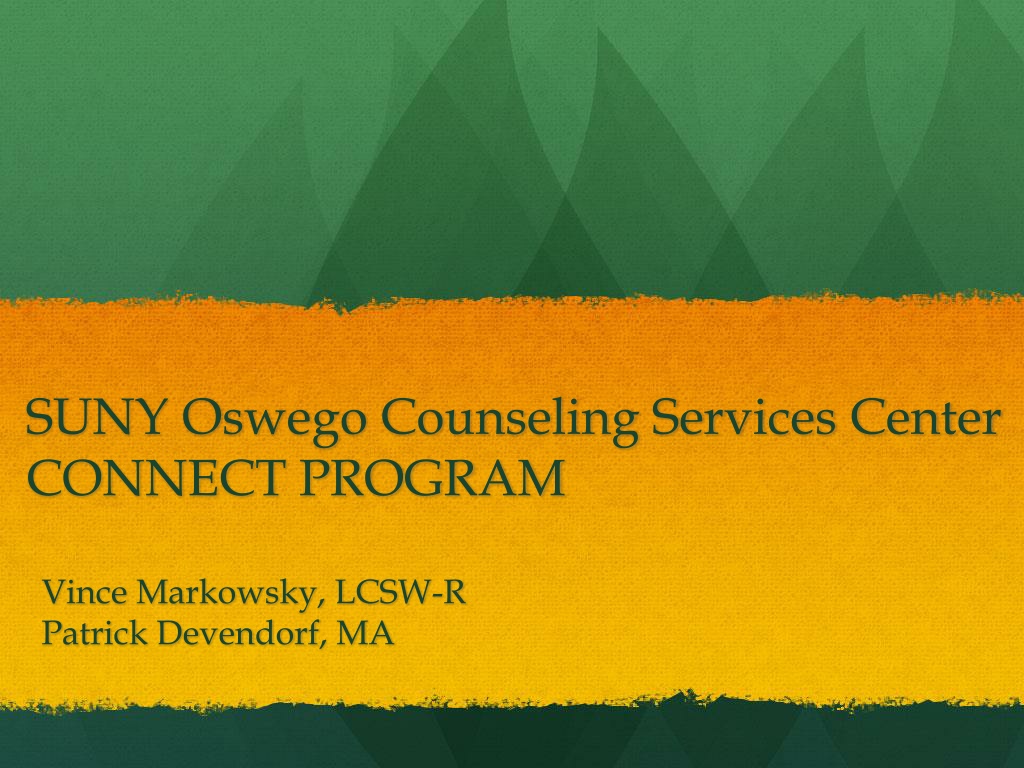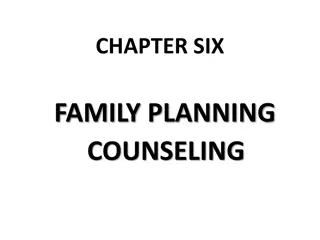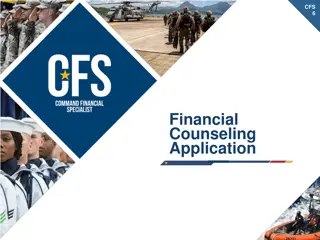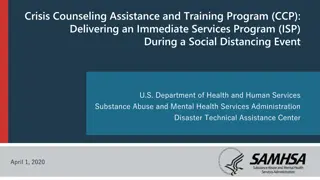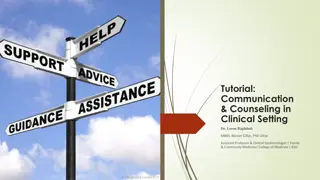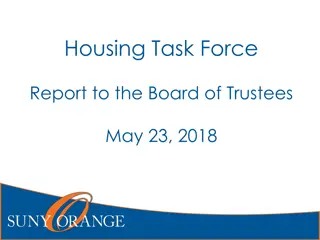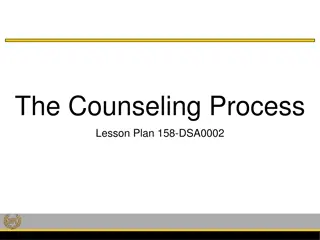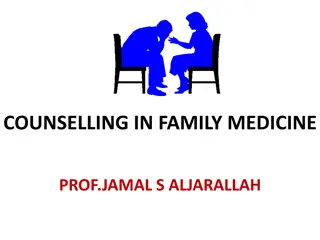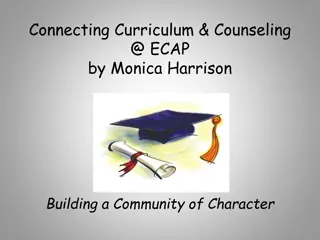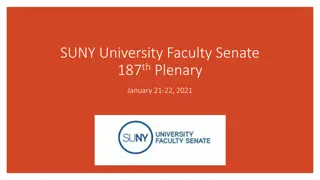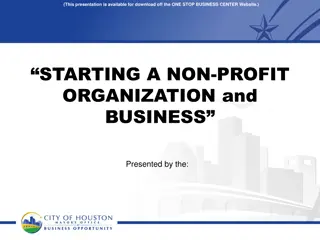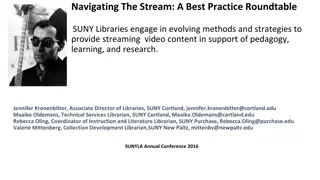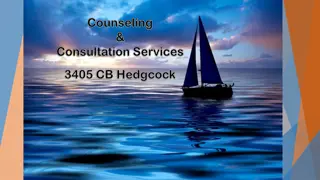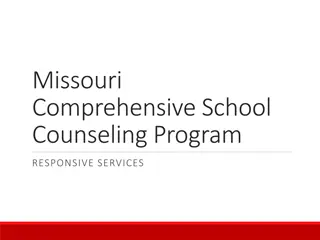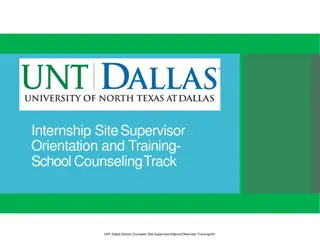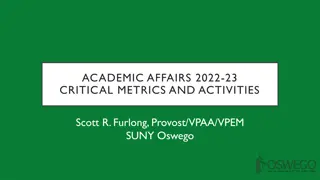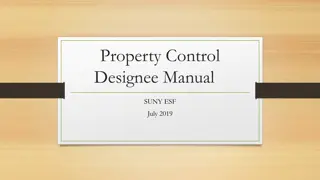SUNY Oswego Counseling Services Center Connect Program Overview
The SUNY Oswego Counseling Services Center Connect Program, led by Vince Markowsky, LCSW-R, and Patrick Devendorf, MA, aims to support students in improving social connections and self-advocacy on campus through peer support groups and therapeutic processes. The program emphasizes inclusivity and collaboration among various campus resources for student referrals. Referral sources include the Counseling Services Center, Office of Accessibility Resources, Residence Life and Housing, self-referrals, and Judicial Affairs. The program's purpose is to foster a community that promotes social interactions and self-improvement. The Breakfast Club analogy is used to illustrate the program's approach. The program's success is evident in the positive impact it has had on students, as seen in the patterns identified through referrals.
Download Presentation

Please find below an Image/Link to download the presentation.
The content on the website is provided AS IS for your information and personal use only. It may not be sold, licensed, or shared on other websites without obtaining consent from the author. Download presentation by click this link. If you encounter any issues during the download, it is possible that the publisher has removed the file from their server.
E N D
Presentation Transcript
SUNY Oswego Counseling Services Center CONNECT PROGRAM Vince Markowsky, LCSW-R Patrick Devendorf, MA
Disclaimer Neither of us have any actual or potential conflict of interest in relation to this program/presentation The pictures of students you will see during this presentation are participants of the Connect Program and all have signed consents to allow their pictures to be used for this presentation
FSU player Travis Rudolph, a star wideout for the FSU Seminoles Football Team visited a school and Saw Bo Paske, a sixth grade student, sitting by himself. He chose to sit with the student. It s not magic; sometimes it just pizza.
The Connect Program: How It Came About Needs Identification: View from the Office of Accessibility Resources View from the Counseling Services Center Initial Collaborative Program: Project O-S You
Purpose for the Group The Connect Program is a peer support group that incorporates a therapeutic process in supporting students to improve their social connections and ability to self- advocate on campus through group activities and discussions.
Referral Sources Counseling Services Center Office of Accessibility Resources Residence Life and Housing Student self-referral Judicial Affairs
The Breakfast Club Analogy https://www.youtube.com/watch?v=9omHSTgIn6 g&t=37s https://www.youtube.com/watch?v=zY3U9thXFl A
Referrals That Have Been Made: Patterns Identified Though Not Limited to .
Screening Process Reaching out to the student to engage their interest and to set up a group screening session Intake Interview Completion of needed forms: Informed consent for Group Counseling Social Media Consent/Release Form Consent to record/video tape Group Evaluation Form Goal Setting Activity Sheet
Examples of Identified Road Blocks Road Blocks: I don t know how to express myself and have this feeling of disconnection towards people. I have social anxiety, I feel left out, and I am not comfortable talking to people that I don t know I lack understanding of people s intentions and behaviors. I don t give myself enough chances to open up to new people to me
Examples of Goals Goals: I want to learn how to express and understand my feelings. I would like to build better connections with others and gain close friends. I would like to become a better, nicer, more compassionate person. I would like to be more extroverted, and would like to know when to get up and leave Would like better confidence in public speaking and a better sense of security in talking with peers on campus
Program Structure From beginning to end of semester, typically fall and spring semesters 1 session per week Goal of doing a field trip once every 3rd week 1 to 1.5 hours per session (time extended for field trips as needed) Establishment of group norms, including rules of cofidentiality Comfortable location w/ seats in a circle Snacks and Beverages
A Brief Opportunity for Questions ..
Program Activities Weekly check-in with Gripes and Brags Opportunity to suggest topics of discussion Guest Speakers Field Trips Planned activites Promotion of social skills development Opportunities to practice social skills Sharing of feedback to and from each other Opportunities to practice presentations and job interviews Discussion on methods of communication and how to manage relationships
Common Topic used in Discussions and Activities Small talk transitioning to main idea Eye Contact Self awareness Body Language, facial expression, voice inflection Use of humor Romantic relationships Boundaries Self-advocacy with peers, staff, and faculty
Field Trips We Have Done Nature walks in parks Community walks Eating together on campus in the dining halls Eating together off campus Low ropes course Camp Hollis Camp Fire making S Mores Bowling
Pre and Post Evaluation Statistics/Results A 16 item Likert Scale was administered pre and post during the spring 2017, fall 2017, and spring 2018 semesters. Results for the 3 semesters were combined with a sample size of 9 students total. P-score and T-Test analysis was completed assuring a minimum of a 90% confidence level. Likert raw scores were transposed to standard normal distribution scores.
Likert scale measured the following 16 skills/aptitudes: Ability to manage stress Ability to be comfortable in starting a conversation Ability to recognize positive, desirable friendship qualities in others Self-confidence to interact with others Ability to express emotions to others Comfort in ability to use humor in interactions with others Ability to keep conversations going once they are started Self-perception of healthy boundaries with others
16 Skills/aptitudes measured (continued) Ability to interpret on-verbal social cues Self-perception of level of connectedness with others around them Self-awareness of facial expression, body language and voice inflection when communicating Ability to be flexible in their interactions with others Level of satisfaction with number of friends Perception of other s level of comfort within conversation Ability to self-advocate within peer relationships Willingness/ability to take efforts in improving their social connections on campus.
Pre and Post Evaluation Results Fall 2017 semester there was a 13.98% increase in the mean score of all 16 items amongst 4 students from the beginning to the end of the semester. Spring 2018 semester reflected a 7.5% increase amongst 6 students. Spring 2018 results reflected that students made the highest amount of growth in their ability to advocate for themselves with peers. Spring 2018 results reflected that students appeared to regress in their ability to manage stress and to maintain flexibility within their social interactions.
Challenges Managing time for group planning along with managing our more primary responsibilities. Securing buy in to the program for students with elevated social anxiety. Consistency in attendence. Managing equity of student participation. Balancing option to pass with encouraging productive risk for growth. Scheduling conflicts.
Changes For The Future More time allocated to planning. Facilitating role plays. Video taping role plays to promote feedback and group discussion. On campus activities that promote use of social skills and self advocacy skills (i.e. Scavenger Hunt). Centro Bus Training. More activities and discussions for development of stress management strategies and social flexibility skills.
Who we are Patrick Devendorf, MA Assistant Coordinator Office of Accessibility Resources 155 Marano Campus Center 315 312 3358 oar@oswego.edu Vince Markowsky, LCSW-R Counselor SUNY Oswego Counseling Services Center 104 Walker Health Center 315 312-4416 vincent.markowsky@oswego.edu
